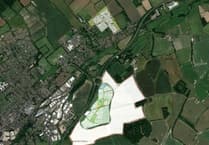Engineers working to repair a huge landslip at Hook in Hampshire will temporarily remodel undamaged track to give passengers a better train service while long-term repairs continue.
The slip, which left a 44-metre stretch of track suspended in mid-air on an embankment to the northeast of Hook station, has left only two tracks of the four-track railway passable by trains, with both tracks designed to be used by London-bound trains only.
This has had a significant impact on the South Western Railway (SWR) network, severely restricting the number of trains that can safely run between Basingstoke and Woking.
This restriction has resulted in no through trains being able to run from London Waterloo to several stations, including Exeter, Salisbury, Weymouth, Bournemouth, Southampton Central, Winchester, and Portsmouth Harbour via Eastleigh.
This weekend, Network Rail will close the railway, between Basingstoke and Woking, to allow engineers to reconfigure the track layout and bypass the landslip.

Network Rail Wessex Route Director, Mark Killick, said: “We’re going to move the track onto a stable section of the embankment so that we can have a line running in each direction.
“While it’s a very unusual approach to change the track layout, it means we can run more trains and give customers a much better experience while we fix the embankment.
“The only downside is that we will need to close the railway again once the embankment is repaired to restore the track layout to its original position, but it’s gives the least disruptive solution for our customers.
“In the meantime, we will be able to continue the embankment repairs, while running a significantly improved train service. We’ll have hundreds of engineers working round the clock, but we still expect the fix to take a number of weeks, as it’s a very complex engineering project.
“We’ll update customers with a more definitive timescale to reopen all four lines as soon as we can.”
After this weekend’s works, Network Rail in partnership with South Western Railway will be able to offer a significantly improved service which will restore crucial transport links that have been cut off since the weekend.
It also means trains can serve all stations again, with the exception of Hook station where trains travelling towards Basingstoke will not be able to stop due to the position of the landslip.
As the landslip is in a remote location, engineers needed to build a 580-metre-long access road across fields to get materials and machinery to the site.
Engineers will construct a 60-metre retaining wall, made up of almost one hundred 12-metre long ‘sheet piles’ which are driven into the ground to stabilise the embankment and protect the railway from future landslips. They will also regrade the steepness of the embankment slope to reduce the risk of material falling.
Mark added: “I’d like to say how sorry I am for the disruption our customers are facing. We’re working round the clock to fix the railway as quickly and safely as possible.
“Thank you in advance to the people who live nearby while we carry out the repairs, they’ve been very understanding and supportive.”
Claire Mann, South Western Railway's managing director, said: “We are very sorry for the ongoing disruption due to the landslip at Hook on Saturday 14, which has meant a severely reduced service on one of the country’s busiest railway lines.
“We know how frustrating this week has been for our customers, particularly those in the Hook, Winchfield, and Fleet areas, with trains unable to stop at these stations.
“Our colleagues at Network Rail are working around the clock and their work over the weekend means we will be able to reinstate direct services from London to Exeter and Weymouth on Monday 23, albeit with a reduced frequency.
“Until these initial works by Network Rail are completed, we must urge customers to only travel if absolutely necessary between Basingstoke and Woking. We would like to thank customers for their patience and understanding.”
The railway through Hook was built 130 years ago, out of London clay, which is notoriously unsuitable for building railways on. Unfortunately, they didn’t know that then, and passengers are suffering the consequences.
Clay absorbs water, rather than draining, which makes it vulnerable to prolonged very wet weather and freezing conditions.
In the southern region of its network, Network Rail has suffered more than 200 earthworks failures in the past three years alone, and 25 of those have resulted in big line closures that have disrupted passengers.
Network Rail adds these are becoming more and more frequent due to climate change. The Met Office says the UK has suffered seven of its 10 wettest years on record since 1998, and more rain means more landslips.



